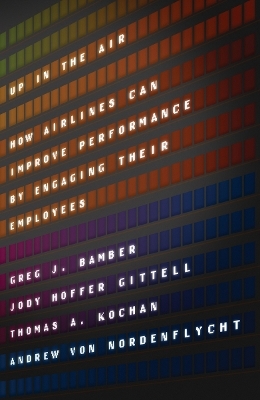
Up in the Air
Ilr Press (Verlag)
978-0-8014-4747-1 (ISBN)
"And you thought the passengers were mad. Airline employees are fed up, too-with pay cuts, increased workloads and management's miserly ways, which leave workers to explain to often-enraged passengers why flying has become such a miserable experience."—The New York Times, December 22, 2007
When both an industry's workers and its customers report high and rising frustration with the way they are being treated, something is fundamentally wrong. In response to these conditions, many of the world's airlines have made ever-deeper cuts in services and their workforces. Is it too much to expect airlines, or any other enterprise, to provide a fair return to investors, high-quality reliable service to their customers, and good jobs for their employees? Measured against these three expectations, the airline industry is failing. In the first five years of the twenty-first century alone, U.S. airlines lost a total of $30 billion while shedding 100,000 jobs, forcing the remaining workers to give up over $15 billion in wages and benefits. Combined with plummeting employee morale, shortages of air traffic controllers, and increased congestion and flight delays, a total collapse of the industry may be coming.
Is this state of affairs inevitable? Or is it possible to design a more sustainable, less volatile industry that better balances the objectives of customers, investors, employees, and the wider society? Does deregulation imply total abrogation of government's responsibility to oversee an industry showing the clear signs of deterioration and increasing risk of a pending crisis?
Greg J. Bamber, Jody Hoffer Gittell, Thomas A. Kochan, and Andrew von Nordenflycht explore such questions in a well-informed and engaging way, using a mix of quantitative evidence and qualitative studies of airlines from North America, Asia, Australia, and Europe. Up in the Air provides clear and realistic strategies for achieving a better, more equitable balance among the interests of customers, employees, and shareholders. Specifically, the authors recommend that firms learn from the innovations of companies like Southwest and Continental Airlines in order to build a positive workplace culture that fosters coordination and commitment to high-quality service, labor relations policies that avoid long drawn-out conflicts in negotiating new agreements, and business strategies that can sustain investor, employee, and customer support through the ups and downs of business cycles.
Greg J. Bamber is a Professor at Monash University in Melbourne, Australia, and a Visiting Professor at Newcastle University of Newcastle, England. Jody Hoffer Gittell is Associate Professor in The Heller School for Social Policy and Management at Brandeis University. Thomas A. Kochan is George M. Bunker Professor of Management at the MIT Sloan School of Management. Andrew von Nordenflycht is Assistant Professor of Business Administration at Simon Fraser University.
Preface
1. Low-Cost Competition in the Airline Industry
2. Developments in the U.S. Airline Industry
3. Developments in the Airline Industry in Other Countries
4. Industry Trends in Costs, Productivity, Quality, and Morale
5. Alternative Strategies for New Entrants: Southwest vs. Ryanair
6. The Legacy Responses: Alternative Approaches
7. Building a More Balanced Airline Industry
Notes
Index
| Verlagsort | New York |
|---|---|
| Sprache | englisch |
| Maße | 152 x 229 mm |
| Gewicht | 907 g |
| Themenwelt | Natur / Technik ► Fahrzeuge / Flugzeuge / Schiffe ► Luftfahrt / Raumfahrt |
| Recht / Steuern ► EU / Internationales Recht | |
| Technik ► Luft- / Raumfahrttechnik | |
| Wirtschaft ► Volkswirtschaftslehre ► Makroökonomie | |
| ISBN-10 | 0-8014-4747-X / 080144747X |
| ISBN-13 | 978-0-8014-4747-1 / 9780801447471 |
| Zustand | Neuware |
| Informationen gemäß Produktsicherheitsverordnung (GPSR) | |
| Haben Sie eine Frage zum Produkt? |
aus dem Bereich


